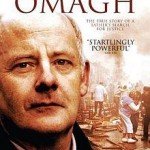 Omagh is a made for television film, produced by Republic of Ireland broadcaster RTÉ and Britain’s Channel Four. It was directed by Pete Travis and released in 2004. Omagh stars Gerard McSorley as Michael Gallagher, Michele Forbes as Patsy Gallagher, Brenda Fricker as Nuala O’Loan and Stuart Graham as Victor Barker. The film is a dramatisation of the Real IRA’s bombing of downtown Omagh in August 1998. This blast was preceded by an ambiguous telephone warning, delivered to a local television station. The unclear warning resulted in police herding civilians into the proximity of the 220 kilogram bomb, rather than away from it. As a consequence 29 people were killed and more than 200 were injured. Ten of the dead were children or teenagers; 18 were Catholic and 11 Protestant. The bombing of Omagh was the deadliest single incident of the Troubles. Despairingly for the victims, it occurred four months after the signing of the Good Friday Agreement.
Omagh is a made for television film, produced by Republic of Ireland broadcaster RTÉ and Britain’s Channel Four. It was directed by Pete Travis and released in 2004. Omagh stars Gerard McSorley as Michael Gallagher, Michele Forbes as Patsy Gallagher, Brenda Fricker as Nuala O’Loan and Stuart Graham as Victor Barker. The film is a dramatisation of the Real IRA’s bombing of downtown Omagh in August 1998. This blast was preceded by an ambiguous telephone warning, delivered to a local television station. The unclear warning resulted in police herding civilians into the proximity of the 220 kilogram bomb, rather than away from it. As a consequence 29 people were killed and more than 200 were injured. Ten of the dead were children or teenagers; 18 were Catholic and 11 Protestant. The bombing of Omagh was the deadliest single incident of the Troubles. Despairingly for the victims, it occurred four months after the signing of the Good Friday Agreement.
Omagh opens with footage of Real IRA volunteers manufacturing the bomb and transporting it into the city centre. The car is parked on a busy shopping street and people of Omagh go about their business, unaware of its deadly cargo. When the bomb detonates it is surrounded by civilians, most of them women and children. The film’s focus shifts to Michael Gallagher. Gallagher is a quietly spoken mechanic, a family man with no interest or involvement in politics. He undertakes a frantic search for his 21-year-old son Aiden, who was in town when the bomb exploded. Gallagher sees the devastation and suffering in downtown Omagh. He eventually learns that his son has been killed. Grief stricken at first, Gallagher later forms a support group for the victims and their relatives. Under his leadership the group demands justice, seeking answers from investigators and authorities. As Gallagher doggedly proceeds he encounters the murky politics of the IRA and a lack of transparency from authorities and police.
Omagh invited criticism and controversy when released in the spring of 2004. With its handheld cameras and documentary pacing, the film is confronting and painfully graphic. Omagh debuted less than six years after the events it portrays; some critics suggested this was too soon, given the confronting nature of the film. There were reports of survivors of the bombing being emotionally distraught or overwhelmed during screenings. Also controversial was the film’s scathing depiction of the Royal Ulster Constabulary. Omagh makes clear allegations of incompetence and cover up, despite the fact that investigations were still continuing when the film was released. Whatever its faults, Omagh is a harrowing account of how ordinary people were affected by the violence of the Troubles. Its focus on victims, rather than perpetrators or politics, makes for powerful viewing.
© Alpha History 2017. Content on this page may not be republished or distributed without permission. For more information please refer to our Terms of Use.
This page was written by Jennifer Llewellyn and Steve Thompson. To reference this page, use the following citation:
J. Llewellyn and S. Thompson, “Omagh (2004)”, Alpha History, accessed [today’s date], https://alphahistory.com/northernireland/omagh-2004/.
